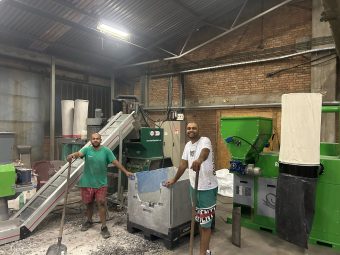Every individual has the potential to contribute to the efficient functioning and progress of society, yet societies are often not designed to enable individuals to realize their full potential. To create a better society, we need people with vision who recognize the value of others and can break the chains that have held us back.
This is precisely the mission of the ecological cooperative Connect Clean Roma Group (CCRG) – to empower informal waste collectors, the invisible heroes of our daily lives who still remain on the margins of society, and to integrate them into the formal recycling industry.

Kilino Stojkov, General Manager of CCRG, explained that the cooperative helps informal collectors become recognized members of the industry by enabling them to sell their raw materials through the cooperative, obtain legal status, and secure a sustainable source of income.
“First and foremost, we strive to encourage analytical thinking about the importance of their role in the recycling industry, the green agenda, and sustainable development. We try to explain to them that they are a key factor without which the entire industry could not function,” says our interviewee.
However, the legislative framework in Serbia still hinders their full integration, leaving part of the work in the grey economy. The law clearly states that the trade in secondary raw materials must occur exclusively between authorized entities; however, certain financial regulations allow the purchase of secondary raw materials from individuals with a 10.6 percent tax payment. This is why CCRG acts as an intermediary – between collectors, the state, and the private sector – building a bridge that connects different interests towards a common goal.
Stojkov adds that the concept of the circular economy is still not sufficiently rooted in Serbia. It seems that people and institutions have yet to understand that we live in a time of limited resources, and that recycling, along with the rational use of materials, is key to survival. CCRG views recycling not just as an economic activity, but as a fusion of economy, sociology, and ecology – a model that benefits everyone.
The main obstacles are a lack of cooperation between the private and public sectors, slow innovation development, and insufficient education on the topic. However, this is not a reason to give up, but rather a call for an even stronger fight to raise awareness and improve the system.
IN FOCUS:
- Potential and Challenges of Nuclear Propulsion for Commercial Ships
- Technological Breakthrough In the Fight Against Wildfires
- How to Get More Electric Vehicles on Serbian Roads
Ecological Cable Recycling
The illegal burning of cables is one of the most significant environmental issues in Serbia. CCRG has set a clear mission: to eliminate this practice and increase the recycling rate by stopping the purchase of burnt copper.
“To solve this complex problem, we must appeal to the biggest buyers in Europe, China, and the United States. Although it is clear that collectors are damaging the environment, the root of the problem lies in the high demand for this raw material,” explains Stojkov.
The cooperative’s factory uses state-of-the-art European machines for cable recycling – from shredding and magnetic separation to granulation, where copper is separated from plastic. Aware of the challenges, they have managed to optimize processes and extract an additional two percent of copper from the insulating plastic, thus maximizing resource utilization. Innovation does not stop here – they are in the final phase of developing a system that will enable the complete use of cables, promising to revolutionize the recycling industry.
Prepared by Milena Maglovski
Read the story in the new issue of the Energy portal Magazine SUSTAINABLE MOBILITY

